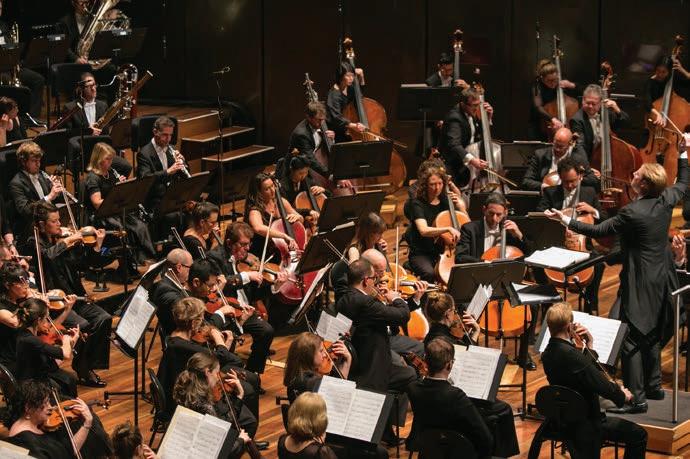Program Notes
PETER ILYICH TCHAIKOVSKY (1840–1893)
Eugene Onegin: Polonaise
Eugene Onegin was first suggested to Tchaikovsky as the basis for an opera by the singer Yelizaveta Lavrovskaya on 6 June 1877 [in the new-style calendar]. Initially, Tchaikovsky baulked at the suggestion. Like many Russians, he loved Alexander Pushkin’s novel for its superb use of language; the tale itself was slender. After a sleepless night, however, Tchaikovsky came up with a scenario. He had rightly perceived that the sort of music he wrote was uniquely equipped to replicate Pushkin’s narrative voice. After he and Konstantin Shilovsky had prepared a libretto which retained a great deal of Pushkin’s original verse, Tchaikovsky began composing the Act I scene where Tatiana ill-advisedly pours out her heart to the cad, Onegin. This is ‘Tatiana’s Letter Scene’, an occasional feature of concert programs.
The real brilliance of Tchaikovsky’s opera has only recently been critically recognised. Richard Taruskin, writing in the New Grove Dictionary of Opera, praises the way Tchaikovsky’s affected artlessness supports ‘the essence of an opera that celebrated the triumph of innocence over guile’, and the way Tchaikovsky couches his music in idioms redolent not of Tchaikovsky’s own period but of the domestic, theatrical and ballroom style of the period in which Pushkin located his story. In this, as in many other ways, Tchaikovsky transformed the orchestra into an effective narrative voice.
Tchaikovsky avoided calling this work an opera, preferring instead to describe it as lyric scenes. He told Madame von Meck, his patron, that ‘there are no scenic effects, the music lacks brilliance
and rhetorical effectiveness.’ Anybody who listens to these brilliant dances would doubt that. The composer of those theatrical staples Swan Lake and The Nutcracker is not far away. He never is: not even in the symphonic works.
The Polonaise is from the beginning of Act III. The bored and world-weary Onegin, who years before had coldly rejected Tatiana’s declaration of love, now meets her again at a ball at Prince Gremin’s house. This time it is Onegin who falls head over heels in love with Tatiana, but since their last meeting, Tatiana has met and married Prince Gremin, and although she still loves Onegin, she will not leave her husband.
Symphony Australia © 2000/2003
SERGEI RACHMANINOV (1873–1943)
Piano Concerto No.3 in D minor, Op.30
I. Allegro ma non tanto
II. Intermezzo (Adagio) –
III. Finale (Alla breve)
Joyce Yang piano
The Piano Concerto No.3 was composed at Rachmaninov’s summer estate at Ivanovka in 1909. Rachmaninov wanted a new concerto for his forthcoming American tour. He hadn’t been keen on going to America at first, but was persuaded to go because the income from a concert tour would provide him with the necessary funds to purchase a car.
This was a busy period in Rachmaninov’s life, and as a result he was unable to spend much time practising prior to embarkation. It is extraordinary, therefore, considering the difficulties in the solo part of this work (almost mythologised in the movie Shine), that he practised much of the piano part on a dumb keyboard aboard ship.
| 15–18 September 12
TCHAIKOVSKY, RACHMANINOV AND SMETANA
The work was first performed in New York City under Walter Damrosch that same year. It was followed not much later by a second New York performance under Gustav Mahler of whom Rachmaninov later said, ‘He touched my composer’s heart straight away by devoting himself to my concerto until the accompaniment, which is rather complicated, had been practised to the point of perfection…’
The Third Piano Concerto is, in the words of critic John Culshaw, ‘a masterpiece of conciseness’. For one thing, there are thematic relationships between the first and third movements, which may explain why the second movement is called an intermezzo. Though the Third Piano Concerto lacks none of Rachmaninov’s typical lyricism, much of the melodic material is derived from the opening rhythm, played by clarinet and bassoon and accompanied by strings.
The piano enters with a simple melody which Rachmaninov’s friend, the American composer and conductor Joseph Yasser, believed was derived from a Russian orthodox chant sung at the Monastery of the Cross at Kiev. Although Rachmaninov denied the connection, it is possible that he could have heard the melody as a youngster and absorbed it subconsciously. The theme is next stated in full in a faster tempo by the violas and horns while the piano accompanies.
Some of the structural subtlety of this work is apparent in the next section. After a short piano cadenza and a slowing of the tempo, a variant of the piano’s opening theme is played on bassoons and lower strings. The woodwinds lead in a new direction and the music builds to a big new theme. This, however, is not the second subject, as we might expect. In fact we will hear no more of it until the finale. It is one of those ‘premonitions’ of future themes,
as Culshaw calls them, which gradually add meaning to the work.
The true second subject soon appears, a characteristically Romantic Rachmaninov melody, first introduced very clearly as a variation of the dotted rhythm of the opening. The piano has become more and more dominant and the movement actually culminates in the cadenza. Rachmaninov wrote two of these, leaving it up to the soloist to choose which is performed. Since the cadenza provides the culmination of the material presented so far, as well as providing the necessary virtuoso display, there is little left for the formal recapitulation to do. Another straightforward statement of the simple opening piano theme, and then a sudden ending, almost breathless, promises more.
Rachmaninov initially holds the piano in reserve in the second movement, which begins with some of the saddest music ever to come from the pen of a composer whose characteristic mood, even at the best of times, was one of melancholy. When the piano enters, it gives two versions of its opening theme. The first section builds to an impassioned climax and then slips smoothly into the scherzo middle section. This fast section provides some relief from the gloom, but the tragic atmosphere soon returns.
The Finale breaks in with great urgency. The piano’s opening tattoo is derived from the theme of the very opening of the concerto, and Culshaw sees in the linking of the second and third movements further evidence of the tight structural binding of the concerto. The ‘dotted rhythm’ feel underlies the second subject, which in its melodic shape recalls the theme which has not been heard since the first movement. The largely episodic nature of the development gives the movement a rhapsodic, formless
TCHAIKOVSKY, RACHMANINOV AND SMETANA | 15–18 September 13
impression. The piano presents two light-hearted versions of its opening melody which strike the listener as diversions from the main thrust of the movement, particularly as they arrest the predominantly fast flow.
Eventually, however, we are shepherded back on track with the return of the opening material from the first movement in the lower strings, which is joined by a hint of the first movement’s second subject. The urgent material and the main tempo of the movement return, picking up hints of the second subject of this and the first movement in its momentum. Just as we sense that the wires are being tightened, the concerto’s signature rhythm sounds from the depths of the orchestra, and leads us to a coda in which the ‘mystery’ theme planted in the first movement finally blooms into a broad Romantic statement.
Much is made of the difficulties of this concerto. ‘Oh, the Rach Three!’ says Sir John Gielgud, in awe, in Shine, but the greatness of the concerto lies not merely in its technical hurdles. It lies in the way the material organically grows - and in the way the immense technical challenges never swamp the lyrical purposes of the work.
Gordon Kalton Williams Symphony Australia © 1998
BEDŘICH SMETANA (1824–1884)
Selections from Má Vlast (My Fatherland)
II. Vltava (The Moldau)
III. Blaník
VI. Šárka
Before the mid-19 th century, the musical culture of Bohemia overlapped seamlessly with that of Austria. Mozart, for instance, was practically adopted by Prague in the late 1780s, writing his Prague Symphony, and premiering Don Giovanni there. “My Praguers understand me,” he is quoted as saying. And Czech composers like Jan Václav Voříšek made their careers in Vienna, writing in the same general style as Beethoven or Schubert. Both nations were part of the Habsburg monarchy (later the Austrian Empire). And most educated Czechs spoke German as a first language, the Habsburgs having suppressed Czech as all but a peasant language for more than 100 years.
In 1848 a wave of revolutions swept through Europe, and Czech factions rallied for increased freedoms and democratic reforms. For seven days Prague was the site of an armed uprising. A young composer and pianist named Bedřich Smetana supported the revolt, writing marches for revolutionary units, and in some accounts manning a barricade on the Charles Bridge. The Austrian Army crushed the rebellion, arrested its leaders, and Smetana fled to his parents’ home in the countryside.
Two decades later, Smetana was an established composer in Prague. He had spent a number of years abroad in Göteborg, Sweden, working as a music teacher, and established a friendship with Franz Liszt during his travels. In the meantime, Bohemia had grown more open and a National Revival was in the air, belatedly fulfilling some of
AND SMETANA | 15–18 September 14
TCHAIKOVSKY, RACHMANINOV
the ideals of 1848. Bourgeois Czechs began to draw cultural distinctions between themselves and their Austrian neighbors, and they established a Provisional Theater and other purely Czech institutions. Smetana – who had always spoken German – worked to improve his feeble Czech, eventually gaining fluency. He wrote nationalistic operas including The Bartered Bride, becoming the main musical contributor to the Revival, and was appointed conductor of the Provisional Theater in 1866.
Personal disaster struck Smetana in July 1874 when he not only lost his hearing, but began to suffer from unbearable tinnitus (likely symptoms of syphilis). He had to step down from conducting, but, like Beethoven, continued to compose with his mind’s ear. He worked on a series of orchestral tone poems on Czech themes, ultimately collected as a six-piece cycle called Má Vlast (My Fatherland). On today’s concert we hear three: Vltava (1874), Šárka (1875), and Blaník (1879).
Smetana’s friend Liszt had invented the symphonic poem, and this picturesque, narrative form was a perfect vehicle for a new national Czech canon. Not to mention that by aligning with Liszt’s progressive circle, Smetana further differentiated himself from the conservative Viennese lineage by then exemplified by Johannes Brahms (though Brahms had no issue championing a younger Czech nationalist, Antonín Dvořák.) No longer was Czech music indistinguishable from that of its neighbor.
Vltava
Vltava depicts a trip up the longest river in Bohemia (sometimes known in English by its German name, the Moldau). The music churns and grows, introducing a sweeping, folklike melody. In his own outline of the piece, Smetana described:
The work tells of the flow of the Vltava, beginning from its first two tiny sources – the cold and warm Vltava, the joining of the two little streams into one, then the sweep of the Vltava through the groves and along the meadows, through the countryside where harvest festivals are being celebrated; in the light of the moon the dance of the water-nymphs; on the nearby rocks proud castles rear up, wide mansions and ruins; the Vltava swirls in the St John’s rapids, then flows in a broad sweeping current on to Prague, where the Vyšehrad comes into sight and finally disappears in the distance with its majestic sweep into the Elbe.
Blaník
Blaník is a mountain southeast of Prague that is said to conceal an underground army that will one day defend the Czech lands in a moment of great danger. In some versions of the legend this army is led by Saint Wenceslaus, in others it is made up of Hussites (a movement of religious reformers founded in the 15th century). For this piece, Smetana drew on the Hussite hymn “Ye Who Are God’s Warrior,” and described:
After their defeat the Hussite heroes hide in Blaník hill and wait, in profound sleep, for the moment when they are to come to the help of their country… On the basis of this melody (the Hussite motif) the resurrection of the Czech nation, its future happiness and glory develops.… As a small intermezzo there is also a short idyll contained in this work, a sketch of the landscape around Blaník, a little shepherd-boy rejoices and plays (oboe) and the echo answers him.
Šárka
Šárka is a character from The Maidens’ War, a 12 th century Czech legend about a group of Amazon-like female warriors who revolt against men. The music here is almost Wagnerian, with descriptive instrumental touches: clinking armor
TCHAIKOVSKY, RACHMANINOV AND SMETANA | 15–18 September 15
(percussion), snoring soldiers (bassoon), and calls to arms (trumpet). In Smetana’s words:
It begins with a description of a maddened girl [Šárka], who swears revenge on the entire male generation for the infidelity of her lover. From afar the arrival of Ctirad [a knight] and his weapon-bearers can be heard, as they march forth to humiliate and castigate the women. From afar they hear the (dissembling) cries of a maiden who is tied to a tree. On catching sight of her, Ctirad is struck by her beauty, and, filled with passionate love for her he frees her; she then hands him and his weaponbearers a potion which makes them merry and intoxicates them, and they fall asleep. A bugle call resounds and is answered from where the women are hidden in the distance, and they dash up to do their bloodthirsty deed. The horrors of a mass slaughter, the rage of Šárka, her thirst for revenge now slaked –that is the end of the composition.
© Benjamin Pesetsky 2023
| 15–18 September 16
TCHAIKOVSKY, RACHMANINOV AND SMETANA











Supports gut microbiome health. Life-Space Probiotics + Sleep Support improves sleep quality. Life-Space Probiotics + Stress Relief relieves symptoms of stress. Always read the label and follow the directions for use. *IRI Aztec MarketEdge. Total Probiotics - Australian pharmacy and grocery (units) MAT to 14/08/2022.
MENTAL WELLBEING
ARE CONNECTED
sleep and stress relief support them both PROUDLY PARTNERING WITH learn more
YOUR
AND INNER
Quality
CHAIRMAN’S CIRCLE
Mr Marc Besen AC and the late Mrs Eva Besen AO
Gandel Foundation
The Gross Foundation
Di Jameson OAM and Frank Mercurio
Harold Mitchell Foundation
Lady Potter AC CMRI
Cybec Foundation
The Pratt Foundation
The Ullmer Family Foundation
Anonymous
ARTIST CHAIR BENEFACTORS
Cybec Assistant Conductor Chair
Carlo Antonioli Cybec Foundation
Concertmaster Dale Barltrop
David Li AM and Angela Li
Assistant Concertmaster
Tair Khisambeev Di Jameson OAM and Frank Mercurio
Young Composer in Residence
Melissa Douglas Cybec Foundation
2023 Composer in Residence
Mary Finsterer Kim Williams AM
PROGRAM BENEFACTORS
MSO Now & Forever Fund: International Engagement Gandel Foundation
Cybec 21st Century Australian Composers
Program Cybec Foundation
Digital Transformation Perpetual Foundation – Alan (AGL) Shaw Endowment
First Nations Emerging Artist Program
The Ullmer Family Foundation
East meets West The Li Family Trust, National Foundation for Australia-China Relations
MSO Live Online Crown Resorts Foundation, Packer Family Foundation
MSO Education Anonymous
MSO Academy Di Jameson OAM and Frank Mercurio, Mary Armour, Christopher Robinson in memory of Joan P Robinson
MSO For Schools Crown Resorts Foundation, Packer Family Foundation, Department of Education, Victoria, through the Strategic Partnerships Program
Melbourne Music Summit Department of Education, Victoria, through the Strategic Partnerships Program
MSO Regional Touring Angior Foundation, William & Lindsay Brodie Foundation
Creative Victoria, The Sir Andrew & Lady Fairley Foundation, Freemasons Foundation Victoria, The Gwen and Edna Jones Foundation, Robert Salzer Foundation, Ray and Joyce Uebergang Foundation
The Pizzicato Effect Hume City Council’s Community Grants program, The Marian and E.H. Flack Trust, Flora & Frank Leith Charitable Trust, Australian Decorative And Fine Arts Society, Anonymous
Sidney Myer Free Concerts Sidney Myer
MSO Trust Fund and the University of Melbourne
PLATINUM PATRONS $100,000+
Mr Marc Besen AC and the late Mrs Eva Besen AO
Lady Primrose Potter AC
The Gandel Foundation
The Gross Foundation
David Li AM and Angela Li
Di Jameson OAM and Frank Mercurio Anonymous (1)
VIRTUOSO PATRONS
Packer Family Foundation
$50,000+
The Ullmer Family Foundation
Weis Family Anonymous (1)
IMPRESARIO PATRONS $20,000+
The Aranday Foundation
H Bentley
The Hogan Family Foundation
David Krasnostein AM and Pat Stragalinos
Elizabeth Proust AO and Brian Lawrence
Supporters
18 Supporters
Lady Marigold Southey AC
Kim Williams AM
The Yulgilbar Foundation
Anonymous (2)
MAESTRO PATRONS $10,000+
Mark and Christine Armour
Margaret Billson and the late Ted Billson
Krystyna Campbell-Pretty AM
Andrew Dudgeon AM
Dr Mary-Jane H Gething AO
Colin Golvan AM KC and Dr Debbie Golvan
Danny Gorog and Lindy Susskind
David R Lloyd
Peter Lovell
Maestro Jaime Martin
Farrel and Wendy Meltzer
Nereda Hanlon and Michael Hanlon AM
Opalgate Foundation
Ian and Jeannie Paterson
Christopher Robinson and the late Joan P Robinson
Yashian Schauble
Glenn Sedgwick
The Sun Foundation
Gai and David Taylor
Athalie Williams and Tim Danielson
Lyn Williams AM
The Wingate Group
Jason Yeap OAM – Mering Management Corporation
Anonymous (2)
PRINCIPAL PATRONS $5,000+
Mary Armour
John and Lorraine Bates
Barbara Bell in memory of Elsa Bell
Bodhi Education Fund
Julia and Jim Breen
Shane Buggle and Rosie Callanan
John Coppock OAM and Lyn Coppock
Perri Cutten and Jo Daniell
Ann Darby in memory of Leslie J. Darby
Mary Davidson and the late Frederick Davidson AM
The Dimmick Charitable Trust
Tim and Lyn Edward
Mrs Jaan Enden
Equity Trustees
Bill Fleming
Susan Fry and Don Fry AO
Sophie Galaise and Clarence Fraser
Carrillo Gantner AC and Ziyin Gantner
Dr Rhyl Wade and Dr Clem Gruen
Cecilie Hall and the late Hon Michael Watt KC
Louis J Hamon OAM
Merv Keehn and Sue Harlow
David Horowicz
Dr Alastair Jackson AM
Paul and Amy Jasper
John and Diana Frew
Suzanne Kirkham
Hyon-Ju Newman
Dr Elizabeth A Lewis AM
Sherry Li
Lucas Family Foundation
Dr Jane Mackenzie
The Cuming Bequest
Gary McPherson
Rosemary and the late Douglas Meagher
The Mercer Family Foundation
Newton Family in memory of Rae Rothfield
Ken Ong OAM
Bruce Parncutt AO
David Ponsford
Dr Rosemary Ayton and Professor Sam Ricketson AM
Andrew and Judy Rogers
The Rosemary Norman Foundation
Guy Ross
The Kate and Stephen Shelmerdine Family Foundation
Helen Silver AO and Harrison Young
Anita Simon
Brian Snape AM
Dr Michael Soon
Janet Whiting AM
Anonymous (2)
Supporters
19
ASSOCIATE PATRONS $2,500+
Carolyn Baker
Marlyn Bancroft and Peter Bancroft OAM
Sascha O Becker
Janet H Bell
Alan and Dr Jennifer Breschkin
Patricia Brockman
Nigel and Sheena Broughton
Stuart Brown
Dr Lynda Campbell
Oliver Carton
Janet Chauvel and the late Dr Richard Chauvel
Breen Creighton and Elsbeth Hadenfeldt
Katherine Cusack
Leo de Lange
Sophie E Dougall in memory of Libby Harold
Elaine Walters OAM
Barry Fradkin OAM and Dr Pam Fradkin
Kim and Robert Gearon
Steinicke Family
Gillian Hund OAM and Michael Hund
R Goldberg and Family
Goldschlager Family Charitable Foundation
Colin Golvan AM KC and Dr Deborah Golvan
Jennifer Gorog
C M Gray
Ian Kennedy AM & Dr Sandra Hacker AO
Susan and Gary Hearst
Hartmut and Ruth Hofmann
Doug Hooley
Margaret Jackson AC
Sandy Jenkins
Jenny Tatchell
John Jones
Ann Lahore
Mrs Qian Li
Carolynne Marks
Margaret and John Mason OAM
H E McKenzie
Dr Isabel McLean
Christopher Menz and Peter Rose
Ian Merrylees
Michael Davies and Drina Staples
Alan and Dorothy Pattison
David and Nancy Price
Peter Priest
Ruth and Ralph Renard
Peter and Carolyn Rendit
James Ring
Tom and Elizabeth Romanowski
Christopher Menz and Peter Rose
Jan Ryan
Jeffrey Sher KC and Diana Sher OAM
Barry Spanger
Peter J Stirling
Caroline Stuart
Shirley and Jeffrey Zajac
Anonymous (4)
PLAYER PATRONS $1,000+
Dr Sally Adams
Anita and Graham Anderson
Margaret Astbury
Australian Decorative & Fine Arts Society
Geoffrey and Vivienne Baker
Robbie Barker
Allen and Kathryn Bloom
Michael Bowles and Alma Gill
Joyce Bown
Youth Music Foundation
Miranda Brockman
Drs John D L Brookes and Lucy V Hanlon
Jill and Christopher Buckley
Dr Robin Burns and Dr Roger Douglas
Ronald and Kate Burnstein
Mrs Nola Daley
Panch Das and Laurel Young-Das
Caroline Davies
Natasha Davies, for the Trikojus Education Fund
Rick and Sue Deering
Suzanne Dembo
John and Anne Duncan
Jane Edmanson OAM
Diane Fisher
Grant Fisher and Helen Bird
Alex Forrest
Applebay Pty Ltd
David and Esther Frenkiel OAM
Simon Gaites
20 Supporters
Anthony Garvey and Estelle O’Callaghan
David I Gibbs AM and Susie O’Neill
Sonia Gilderdale
Dr Celia Godfrey
Dr Marged Goode
Dawn Hales
Hilary Hall in memory of Wilma Collie
David Hardy
Tilda and the late Brian Haughney
Cathy Henry
Dr Jennifer Henry
Anthony and Karen Ho
Jenny and Peter Hordern
Katherine Horwood
Penelope Hughes
Jordan Janssen
Basil and Rita Jenkins
Sue Johnston
John Kaufman
Angela Kayser
Drs Bruce and Natalie Kellett
Dr Anne Kennedy
Akira Kikkawa
Dr Judith Kinnear
Dr Richard Knafelc and Mr Grevis Beard
Tim Knaggs
Professor David Knowles and Dr Anne
McLachlan
Dr Jerry Koliha and Marlene Krelle
Jane Kunstler
Kerry Landman
Kathleen and Coran Lang
Bryan Lawrence
Lesley McMullin Foundation
Dr Jenny Lewis
Phil Lewis
Dr Kin Liu
Andrew Lockwood
Elizabeth H Loftus
Chris and Anna Long
Gabe Lopata
John MacLeod
Eleanor & Phillip Mancini
Marshall Segan in memory of Berek Segan
OBE and Marysia Segan
Aaron McConnell
Ian McDonald
Wayne McDonald and Kay Schroer
Don and Anne Meadows
Dr Eric Meadows
Professor Geoffrey Metz
Sylvia Miller
Ian Morrey and Geoffrey Minter
Anthony and Anna Morton
Dr Judith S Nimmo
Laurence O’Keefe and Christopher James
Susan Pelka
Ian Penboss
Kerryn Pratchett
Peter Priest
John Prokupets
Professor Charles Qin OAM and Kate Ritchie
Eli Raskin
Jan and Keith Richards
Roger Parker and Ruth Parker
Dr Peter Rogers and Cathy Rogers OAM
Dr Ronald and Elizabeth Rosanove
Marie Rowland
Viorica Samson
Martin and Susan Shirley
P Shore
John E Smith
Dr Peter Strickland
Dr Joel Symons and Liora Symons
Russell Taylor and Tara Obeyesekere
Geoffrey Thomlinson
Frank Tisher OAM and Dr Miriam Tisher
Andrew and Penny Torok
Christina Turner
Ann and Larry Turner
Leon and Sandra Velik
The Reverend Noel Whale
Edward & Paddy White
Nic and Ann Willcock
Robert and Diana Wilson
Richard Withers
Lorraine Woolley
Anonymous (15)
21 Supporters
OVERTURE PATRONS $500+
Margaret Abbey PSM
Jane Allan and Mark Redmond
Mario M Anders
Jenny Anderson
Dr Judith Armstrong and Robyn Dalziel
Doris Au
Benevity Australia Online Giving Foundation
Lyn Bailey
Mr Robin Batterham
Dr William Birch AM
Richard Bolitho
Dr Robert Brook
Elizabeth Brown
Suzie Brown OAM and the late Harvey Brown
John Brownbill
Roger and Coll Buckle
Jungpin Chen
Charmaine Collins
Dr John Collins
Dr Sheryl Coughlin and Paul Coughlin
Judith Cowden in memory of violinist
Margaret Cowden
Gregory Crew
Sue Cummings
Dr Oliver Daly and Matilda Daly
Merrowyn Deacon
Carol des Cognets
Bruce Dudon
Brian Florence
Chris Freelance
Mary Gaidzkar
David and Geraldine Glenny
Hugo and Diane Goetze
Louise Gourlay OAM
Jan and the late Robert Green
Christine Grenda
George Hampel AM KC and
Felicity Hampel AM SC
Neville Hathaway
Geoff Hayes
William Holder
Rod Home
Gillian Horwood
Noelle Howell and Judy Clezy
Geoff and Denise Illing
Rob Jackson
Wendy Johnson
Irene Kearsey & Michael Ridley
John Keys
Lesley King
Dr Kim Langfield-Smith
Janet and Ross Lapworth
Pauline and David Lawton
Paschalina Leach
Sharon Li
Dr Susan Linton
Kay Liu
The Podcast Reader
Morris and Helen Margolis
Sandra Masel in memory of Leigh Masel
Janice Mayfield
Gail McKay
Shirley A McKenzie
Alan Meads and Sandra Boon
Joan Mullumby
Marian Neumann
Ed Newbigin
Valerie Newman
Brendan O’Donnell
Jillian Pappas
Phil Parker
Sarah Patterson
The Hon Chris Pearce and Andrea Pearce
Peter Berry and Amanda Quirk
William Ramirez
Geoffrey Ravenscroft
Dr Christopher Rees
Professor John Rickard
Peter Riedel
Michael Riordan and Geoffrey Bush
Fred and Patricia Russell
Carolyn Sanders
Dr Nora Scheinkestel
Julia Schlapp
Hon Jim Short and Jan Rothwell Short
Madeline Soloveychik
Dr Alex Starr
Dyan Stewart
Ruth Stringer
22 Supporters
Tom Sykes
Reverend Angela Thomas
Mely Tjandra
Rosemary Warnock
Amanda Watson
Michael Whishaw
Deborah and Dr Kevin Whithear OAM
Charles and Jill Wright
Anonymous (16)
CONDUCTOR’S CIRCLE
Jenny Anderson
David Angelovich
G C Bawden and L de Kievit
Lesley Bawden
Joyce Bown
Mrs Jenny Bruckner and the late Mr John Bruckner
Ken Bullen
Peter A Caldwell
Luci and Ron Chambers
Beryl Dean
Sandra Dent
Alan Egan JP
Gunta Eglite
Marguerite Garnon-Williams
Drs L C Gruen and R W Wade
Louis J Hamon AOM
Charles Hardman
Carol Hay
Jennifer Henry
Graham Hogarth
Rod Home
Lyndon Horsburgh
Tony Howe
Lindsay and Michael Jacombs
Laurence O’Keefe and Christopher James
John Jones
Sylvia Lavelle
Pauline and David Lawton
Cameron Mowat
Ruth Muir
David Orr
Matthew O’Sullivan
Rosia Pasteur
Penny Rawlins
Joan P Robinson
Anne Roussac-Hoyne and Neil Roussac
Michael Ryan and Wendy Mead
Andrew Serpell and Anne Kieni Serpell
Jennifer Shepherd
Suzette Sherazee
Dr Gabriela and Dr George Stephenson
Pamela Swansson
Lillian Tarry
Tam Vu and Dr Cherilyn Tillman
Mr and Mrs R P Trebilcock
Peter and Elisabeth Turner
Michael Ulmer AO
The Hon. Rosemary Varty
Terry Wills Cooke OAM and the late Marian Wills Cooke
Mark Young
Anonymous (19)
The MSO gratefully acknowledges the support of the following Estates:
Norma Ruth Atwell
Angela Beagley
Christine Mary Bridgart
The Cuming Bequest
Margaret Davies
Neilma Gantner
The Hon Dr Alan Goldberg AO QC
Enid Florence Hookey
Gwen Hunt
Family and Friends of James Jacoby
Audrey Jenkins
Joan Jones
Pauline Marie Johnston
C P Kemp
Peter Forbes MacLaren
Joan Winsome Maslen
Lorraine Maxine Meldrum
Prof Andrew McCredie
Jean Moore
Joan P Robinson
Maxwell Schultz
Miss Sheila Scotter AM MBE
Marion A I H M Spence
Molly Stephens
Gwennyth St John
Halinka Tarczynska-Fiddian
23 Supporters
Jennifer May Teague
Albert Henry Ullin
Jean Tweedie
Herta and Fred B Vogel
Dorothy Wood
COMMISSIONING CIRCLE
Cecilie Hall and the Late Hon Michael Watt KC
Tim and Lyn Edward
Weis Family
FIRST NATIONS CIRCLE
John and Lorraine Bates
Colin Golvan AM KC and Dr Deborah Golvan
Sascha O. Becker
Maestro Jaime Martín
Elizabeth Proust AO and Brian Lawrence
The Kate and Stephen Shelmerdine Family Foundation
Michael Ullmer AO and Jenny Ullmer
Jason Yeap OAM – Mering Management Corporation
ADOPT A MUSICIAN
Mr Marc Besen AC and the late Mrs Eva Besen AO
Chief Conductor Jaime Martín
Margaret Billson and the late Ted Billson
Peter Edwards
Shane Buggle and Rosie Callanan
Roger Young
Andrew Dudgeon AM
Rohan de Korte, Philippa West
Tim and Lyn Edward
John Arcaro
Dr John and Diana Frew
Rosie Turner
Sophie Galaise and Clarence Fraser
Stephen Newton
Dr Mary-Jane Gething AO
Monica Curro
The Gross Foundation
Matthew Tomkins
Dr Clem Gruen and Dr Rhyl Wade
Robert Cossom
Cecilie Hall and the late Hon Michael Watt KC
Nereda Hanlon and Michael Hanlon AM
Abbey Edlin
David Horowicz
Anne-Marie Johnson
Margaret Jackson AC
Nicolas Fleury
Di Jameson OAM and Frank Mercurio
Elina Fashki, Benjamin Hanlon, Tair Khisambeev, Christopher Moore
Dr Elizabeth A Lewis AM
Anthony Chataway
David Li AM and Angela Li
Dale Barltrop
Rosemary and the late Douglas Meagher
Craig Hill
Gary McPherson
Rachel Shaw
Anne Neil
Eleanor Mancini
Hyon-Ju Newman
Patrick Wong
Newton Family in memory of Rae Rothfield Cong Gu
The Rosemary Norman Foundation
Ann Blackburn
Andrew and Judy Rogers
Michelle Wood
Glenn Sedgwick
Tiffany Cheng, Shane Hooton
Dr Martin Tymms and Patricia Nilsson
Natasha Thomas Anonymous
Prudence Davis
HONORARY APPOINTMENTS
Life Members
Mr Marc Besen AC
John Gandel AC and Pauline Gandel AC
Sir Elton John CBE
Harold Mitchell AC
Lady Potter AC CMRI
Jeanne Pratt AC
Michael Ullmer AO and Jenny Ullmer
Anonymous
MSO Ambassador
Geoffrey Rush AC
The MSO honours the memory of Life Members
Mrs Eva Besen AO
John Brockman OAM
Saul Lewis
24
Supporters
The Honourable Alan Goldberg AO QC
Roger Riordan AM
Ila Vanrenen
MSO ARTISTIC FAMILY
Jaime Martín
Chief Conductor
Xian Zhang
Principal Guest Conductor
Benjamin Northey
Principal Conductor in Residence
Carlo Antonioli
Cybec Assistant Conductor
Sir Andrew Davis CBE
Conductor Laureate
Hiroyuki Iwaki †
Conductor Laureate (1974–2006)
Warren Trevelyan-Jones
MSO Chorus Director
Siobhan Stagg
Soloist in Residence
Gondwana Voices
Ensemble in Residence
Christian Li
Young Artist in Association
Mary Finsterer
Composer in Residence
Melissa Douglas
Cybec Young Composer in Residence
Christopher Moore
Creative Producer, MSO Chamber
Deborah Cheetham Fraillon AO
MSO First Nations Creative Chair
Dr Anita Collins
Creative Chair for Learning and Engagement
Artistic Ambassadors
Tan Dun
Lu Siqing
MSO BOARD
Chairman
David Li AM
Co-Deputy Chairs
Di Jameson OAM
Helen Silver AO
Managing Director
Sophie Galaise
Board Directors
Shane Buggle
Andrew Dudgeon AM
Martin Foley
Lorraine Hook
Margaret Jackson AC
Gary McPherson
Farrel Meltzer
Edgar Myer
Glenn Sedgwick
Mary Waldron
Company Secretary

Oliver Carton
The MSO relies on your ongoing philanthropic support to sustain our artists, and support access, education, community engagement and more. We invite our supporters to get close to the MSO through a range of special events.
The MSO welcomes your support at any level. Donations of $2 and over are tax deductible, and supporters are recognised as follows:
$500+ (Overture)
$1,000+ (Player)
$2,500+ (Associate)
$5,000+ (Principal)
$10,000+ (Maestro)
$20,000+ (Impresario)
$50,000+ (Virtuoso)
$100,000+ (Platinum)
25 Supporters
Principal Partner

Premier Partners
Education Partner
Major Partners
Orchestral Training

Partner
Government Partners

Venue Partner
Supporting Partners

Thank you to our Partners
Quest Southbank
Bows for Strings
Ernst & Young
Media and Broadcast Partners

Trusts and Foundations



The Sir Andrew and Lady Fairley Foundation, The Angior Family Foundation, The William and Lindsay Brodie Foundation, Flora & Frank Leith Trust, The Gwen and Edna Jones Foundation, The Ray and Joyce Uebergang Foundation, Perpetual Foundation – Alan (AGL) Shaw Endowment, Sidney Myer MSO Trust Fund




East meets West
Program Supporters
Consulate General of the People’s Republic of China in Melbourne
Ministry of Culture and Tourism China
Supporting Partners Consortium Partners
Supporters
Xiaojian Ren & Qian Li
Mr Wanghua Chu & Dr Shirley Chu
Freemasons Foundation Victoria




























































